
Jojanneke van der Toorn on challenges and benefits of LGBTIQ+ employee networks
On 19 May 2022, Jojanneke van der Toorn and Workplace Pride organised the symposium 'LGBTIQ+ employee resource groups: Benefits, challenges and opportunities', hosted by Leiden University. Van der Toorn and Leiden University are proud to have the Workplace Pride chair to bridge the gap between science and practice. The well-attended symposium, in the Academy Building as well as online, provides an update on research into an inclusive workplace.
Van der Toorn opens with a warm welcome to the audience who have gathered in large numbers to be present despite the rain, the viewers at home and the guest speakers who, together with Van der Toorn, will shape to the one-and-a-half-hour conference. She then gives the floor to Professor Anna Einarsdottir, from the University of York. Einarsdottir will take the audience through the results of her research at the National Health Services of the United Kingdom.

Have Employee Resource Groups been derailed?
Einarsdottir's research examines the role LGBTIQ+ employee resource groups (ERGs) play within the NHS today, and what they mean for staff themselves. Staff members of the NHS whose sexual orientation or gender identity differs from the cisgender heterosexual norm find a place within ERGs to make their voices heard, or so it is thought. Einarsdottir's research in fact shows that the composition of these ERGs is not what one would expect, and is characterised by a high percentage of Allies, staff who do not identify as LGBTIQ+, but who do care about the interests of LGBTIQ+ staff and therefore become members.
One explanation for this high percentage of Allies is the pressure to generate 'impact' within the company as an ERG. Here, membership is a seemingly nicely quantifiable result, but a high percentage of Allies in these groups makes that the LGBTIQ+ members can also be a minority within this group. At least, the individual groups because gay men are by far the largest group of members. Einarsdottir tries to convince the audience that it is important to pay more attention to this division in the groups. She also presents the importance of paying more attention to the effects this has on the perception of freedom and openness in order to continue the conversations within the ERGs about the interests of LGBTIQ+ employees. And with success, the audience listens attentively. After her presentation there is time for some questions.
Assessing the needs of LGBTIQ+ employees
Van der Toorn presented the results of her research on identifying the needs of LGBTIQ+ employees. A difficult issue within companies, for the organisation but also for the employees, is what to share and what not to share. What can you ask your staff, and what not? Especially since the introduction of the GDPR, this has become a tricky question for companies looking for information about the needs of their staff, for example the needs and desires among LGBTIQ+ employees. For many HR departments, it is an issue that is no longer (or to a lesser extent) addressed, for fear of collecting too much personal information, and for fear of crossing a line.
Van der Toorn therefore researched the willingness of LGBTIQ+ staff to share information with their employers, not only about their sexual orientation and gender expression, but also about the perceived safety and what they would like to see different. Among other things, this revealed that, when asked with the right intentions, there is more openness among staff than organisations might have expected. It is therefore up to HR departments to find the space within the rules that exist to ask their staff personal questions as well, to make an inclusive workplace truly possible. This can also be done by starting an internal survey on willingness to share relevant personal information. The GDPR and similar laws and regulations are there to protect the individual, but they cannot be allowed to undermine inclusiveness or stall progress.
Panel session
After the audience is informed about the scientific state of affairs, the panel session follows in which a bridge is built between science and practice. In addition to Professor Einarsdottir, three people from the field take a seat at the table: David Pollard from Workplace Pride, Linn ten Haaf from Unilever, and Erik Poolman from PwC. The session is moderated by PhD student Kshitij Mor of Utrecht University. The panel discusses the ways in which people are already dealing with organizing an inclusive workplace and how they are responding to the needs of their LGBTQ+ colleagues. Interesting examples are given, including a case study on gender neutral toilets.
From the LGBTQ+ ERG, the desire for gender-neutral toilets was expressed, which, however, went against the wishes of Muslim members of an ethnic diversity-focused ERG who also wanted to maintain separate toilets for men and women so that female colleagues wearing hidjabs had the option of removing them. Consultation in this case led to the conclusion to make most of the restrooms gender neutral, but to also keep a separate men's and women's restroom on each floor. Interaction with the audience yielded interesting questions and examples. Besides being interested, the audience was very grateful to Van der Toorn, Workplace Pride, and the guest speakers for organizing this symposium.
After the panel discussion, there was still an opportunity to talk about the conference in the central hall of the Academy Building, while enjoying a cup of coffee. The audience sought out not only the speakers but also each other and shared their reasons for attending the symposium today. Many had travelled to Leiden to represent their LGBTIQ+ colleagues. A few were present to learn and gain inspiration for the yet to be established ERG within their own companies. Experiences were shared and questions answered. The audience continued the conversation for a long time, and there remains a lot to discuss on this topic. The next Workplace Pride event will certainly provide an opportunity to do so. See you then!
-
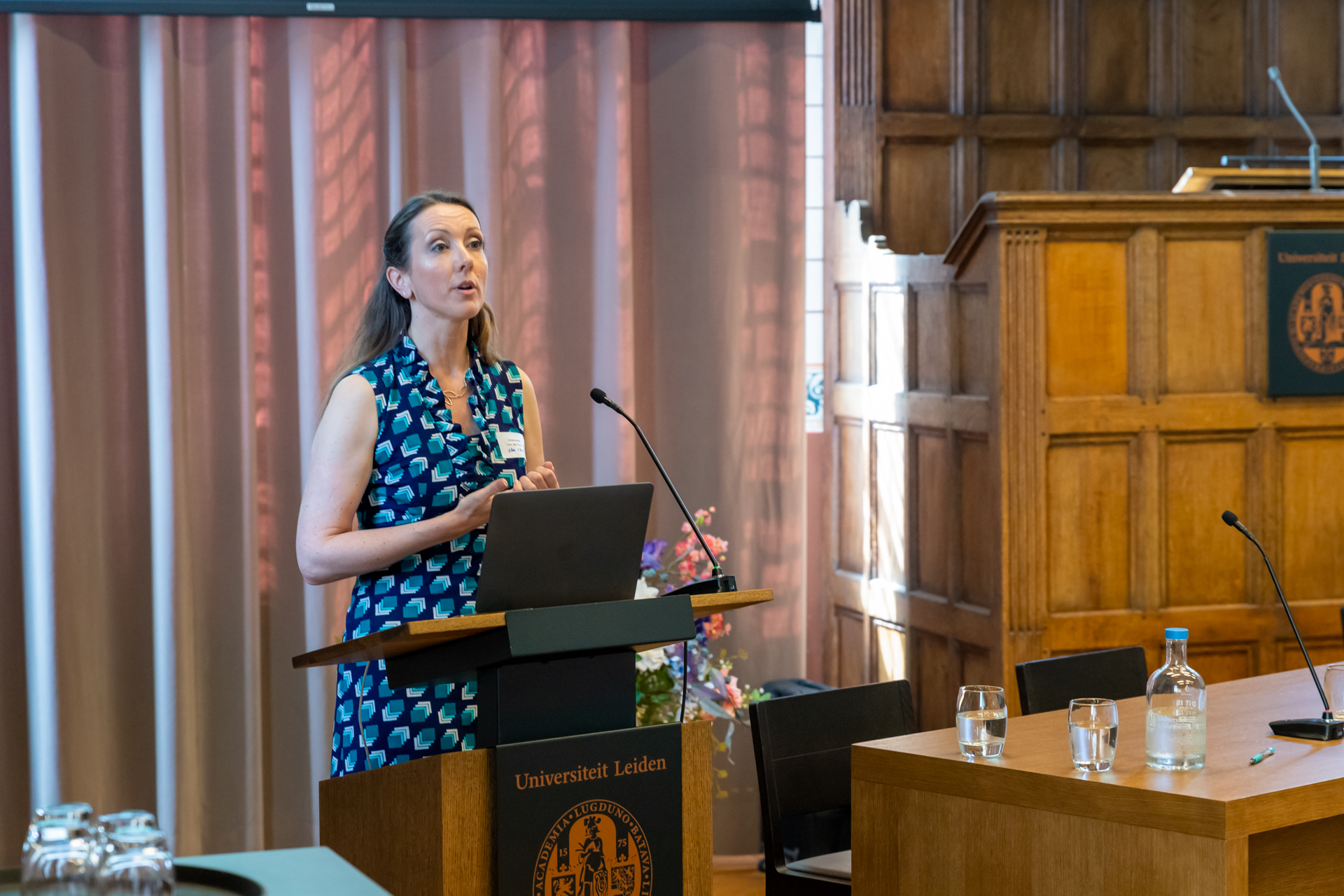
Jojanneke van der Toorn in the Telders Auditorium of the Academy Building during the Symposium 'LGBTIQ+ employees: benefits, challenges and opportunities'. -
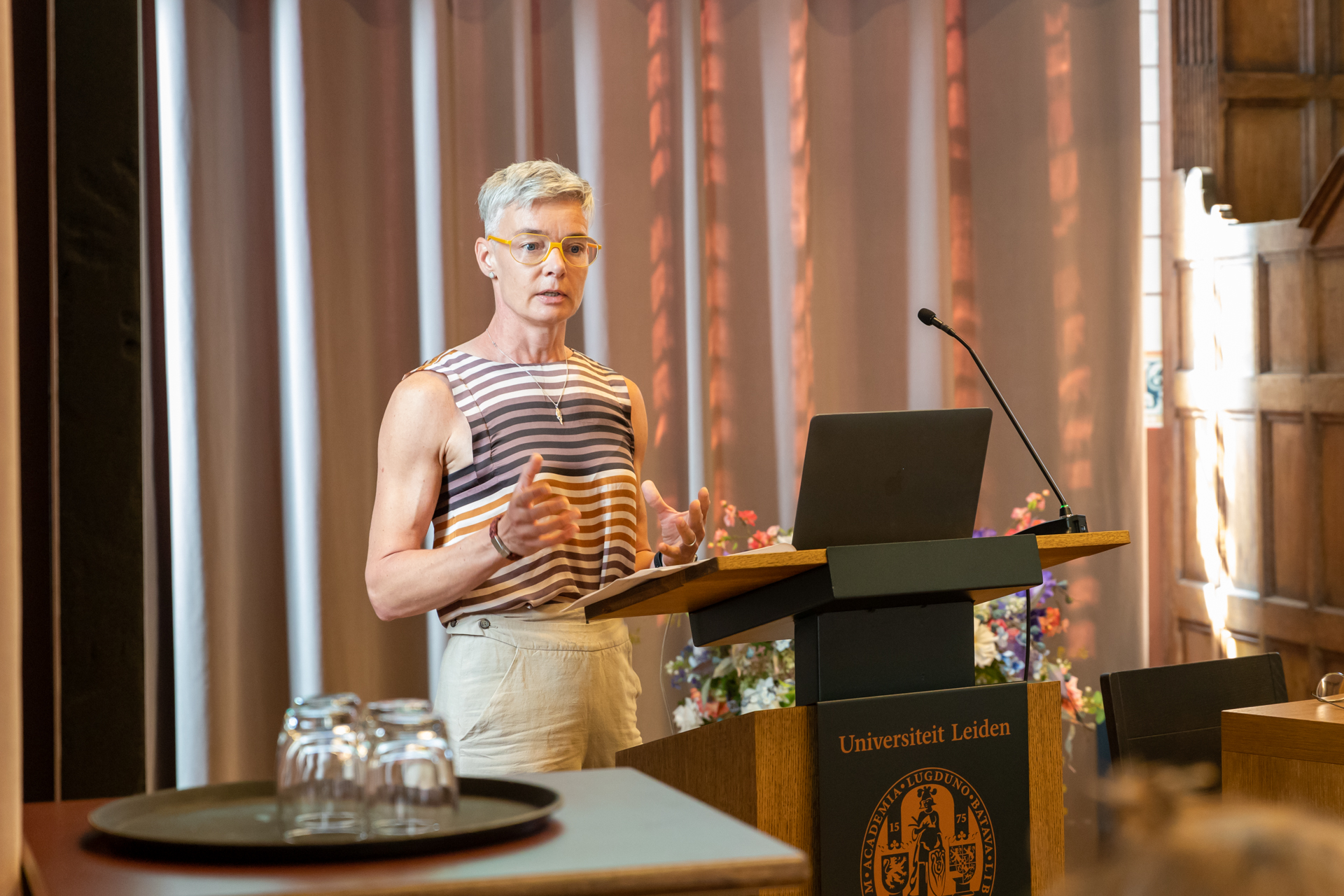
Professor Anna Einarsdottir talks about the role that LGBTIQ+ ERGs play within the NHS in the UK. -
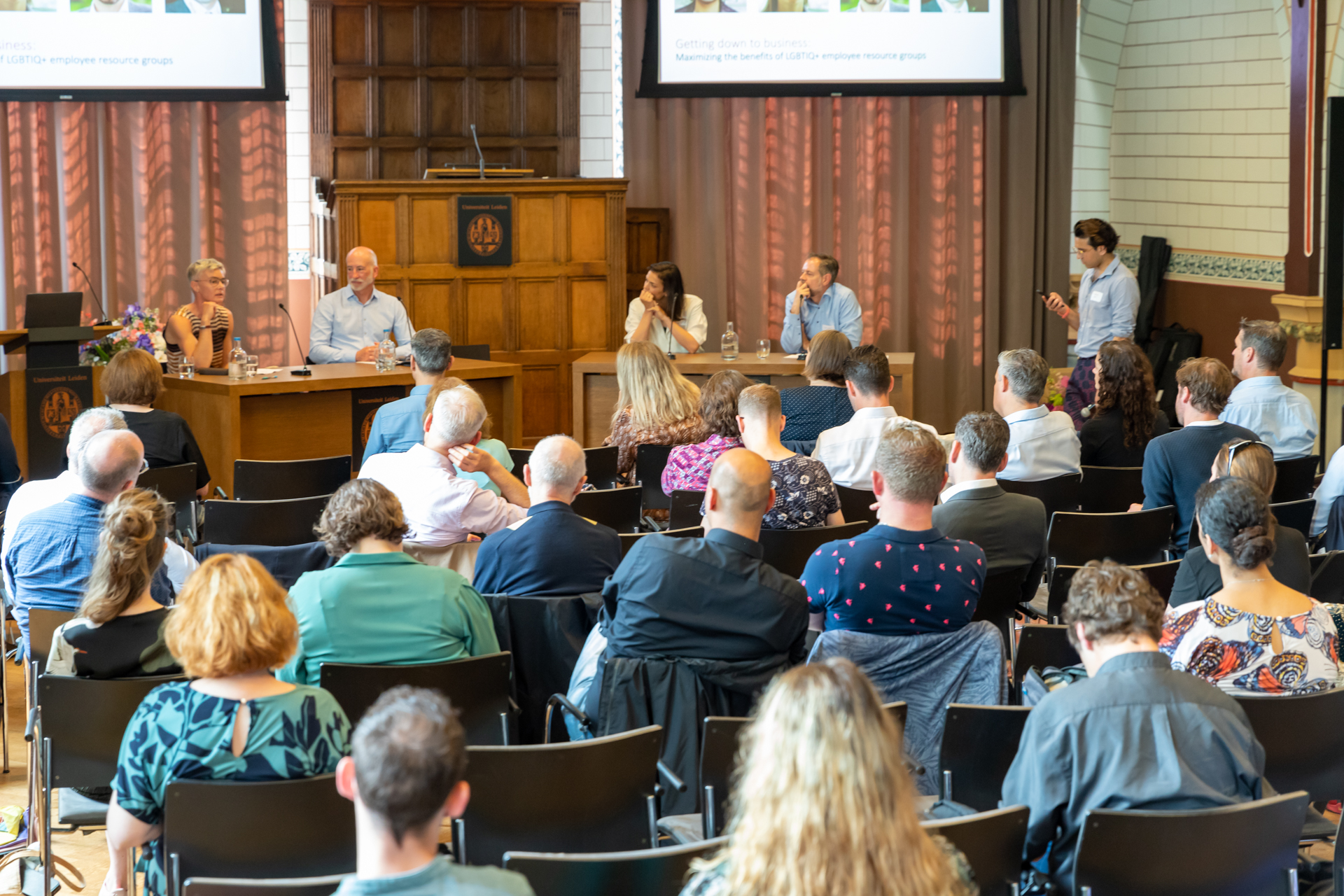
The audience listens attentively to the discussion. The panel consists of, from left to right, Anna Einarsdottir, David Pollard, Linn ten Haaf, Erik Poolman and moderator Kshitij Mor -
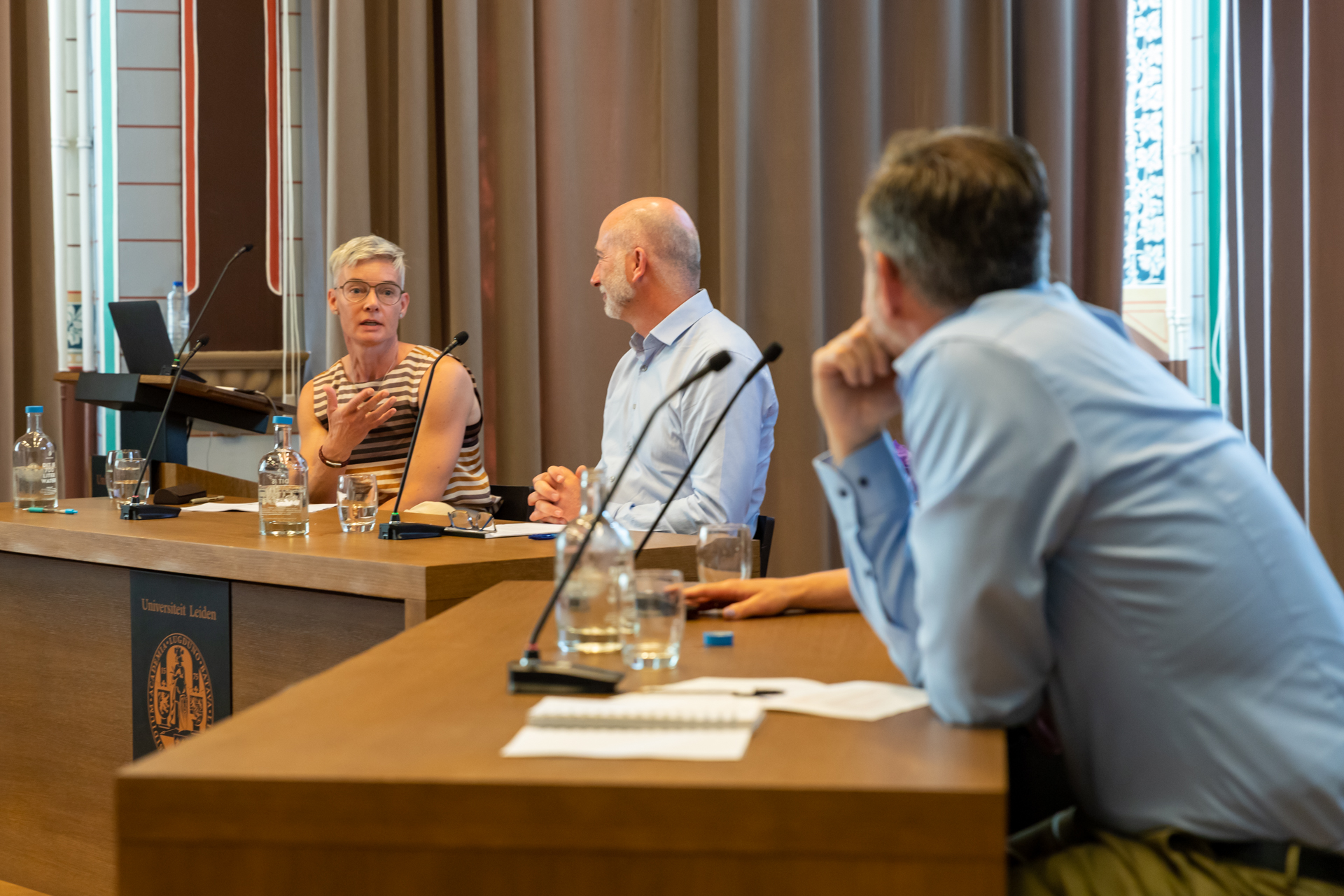
Professor Einarsdottir talks about the implications of her research for practice. -
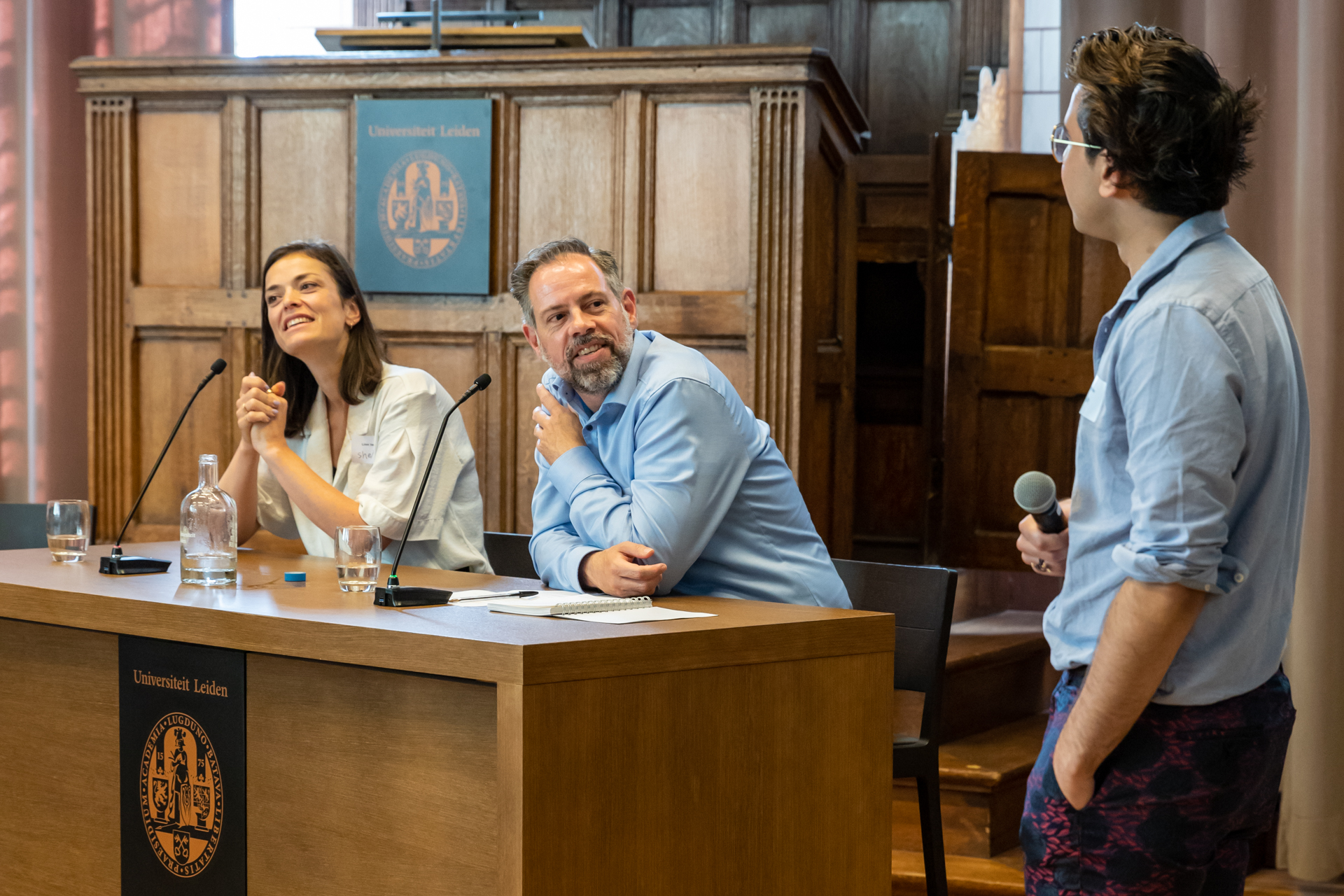
Lynn ten Haaf and Erik Poolman joined the discussion to share their professional experience.
